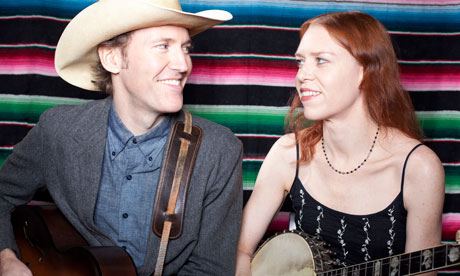If you only know two things about the American singer-songwriter Gillian Welch – and not everyone does – it will be that her name is pronounced with a hard G (as in gigabyte rather than giraffe) and that she is one half of the duo also called Gillian Welch, along with her musical partner, David Rawlings.
It's not what you'd call equal billing, but Rawlings has had almost 20 years to get used to it. It's a vestige of their early days doing the club circuit in Nashville, which in the early 90s favoured solo female artists. "We were funnelled towards that," says Rawlings. Welch goes further and says the prevailing advice was to "get him out of the picture". Hadn't they heard him play guitar? To be fair, Rawlings says, they both still had a lot of developing to do.
We're in a poky conference room at a London hotel. The duo are in the middle of a European tour to promote their superb, long-awaited fifth album. They make a lean and angular pair (a western storyteller would describe them as raw-boned) and both wear cowboy boots. Welch, pale as a stone, has holes in the elbows of her black cardigan, which she sometimes draws tightly round herself, as if she's feeling a chill. There's an occasional yawn. Rawlings – firm-jawed, intelligent and open-faced – answers my questions from under a straw Stetson.
To fathom their music is to sift through their every influence, starting with brother-team acts from the 30s through to Johnny Marr in the 80s; Bob Dylan, Neil Young, Richard Thompson alongside Willie Nelson, Lefty Frizzell and Bill Monroe. Welch started writing songs in the folk-country idiom when she was seven. By her late teens, she says, "I was on a constant quest to make the song I write sound more classic. I always want them to be as good as 'Blue Eyes Crying in the Rain'."
She was an untypical California girl in more ways than one. Welch was an adopted child, born in New York and brought up in Los Angeles. Her adoptive parents – successful TV entertainers and musicians – told her that her biological father had been a musician visiting New York; her birth mother was a first-year college student. The abiding mystery of her parentage is touched upon in several of her songs: "No One Knows My Name"; "I Had a Real Good Mother and Father". Welch says that "Orphan Girl", one of her best-known songs, is also her most autobiographical. And, you could say, a classic.
She met Rawlings (he's from Rhode Island) at Berklee College of Music in Boston. It wasn't a hotbed of country music, according to Rawlings ("There were a lot of kids whose parents had sent them off to learn heavy metal"), but he says there were "enough of us to form a circle". But while he and Welch were happy to sit jamming with kindred spirits, "there was something we recognised when we just played together that interested us more".
That something was what pushed them to try their luck in Nashville, where they eventually attracted the attention of producer T-Bone Burnett (now best known for the Grammy-winning O Brother, Where Art Thou? soundtrack – on which Welch and Rawlings also collaborated). There was also what Welch calls "a completely romantic attachment to the music that came out of Nashville – though we were 30 years too late," she adds, meaning that the greats had been and gone. But the duo have followed in their heroes' footsteps in so far as they are celebrated in their adoptive town, not only on the stage of the Grand Ole Opry but also for their work with stalwarts such as Emmylou Harris, Alison Krauss, Steve Earle and indie-folkies including the Decemberists and Conor Oberst.
Their 1996 debut album Revival was nominated for a Grammy, as was their third, the magnificent Time (The Revelator), released in 2001. "Best contemporary folk" was the category, though their stripped-down style – two voices and two guitars – is harder to pin down than that, with its hues of bluegrass and gospel, country and blues, its laments from the dustbowl, its breezier Appalachian workouts.
In a 10-page profile of the duo in 2004, the New Yorker described their music as "at once innovative and obliquely reminiscent of past rural forms". Commentators are apt to read the mood as mournful (and as Rawlings observes, "Gill always likes the saddest song on a record"), though Welch more accurately identifies it as stoical, and for argument's sake draws their style under the simple umbrella of "acoustic".
Whatever it is, it transcends the sum of its influences and attracts admirers who own no country albums (I'm one of them), and are drawn as much by its unnerving modern dissonances as its timeless meditations on moral ruin or crop failure (and even here you're likely to encounter a lyric such as: "Becky Johnson bought the farm/ Put a needle in her arm"). The nearest historical model for their sound is the prewar brother teams – duettists such as the Blue Sky Boys and the Monroe Brothers, who rode the American country airwaves between the wars. But while Welch and Rawlings have set up house in what they see as a largely abandoned musical form, they reject any idea that they are therefore playing "old" music.
"Setting means a lot in terms of perception," says Rawlings. "If you play something on a banjo, it seems old time. I used to stand on stage in a brand-new Dries Van Noten suit and I would see written next day: 'Standing on stage in his grandfather's sharecropper's suit...'"
In the duo's early career they came in for flak from some critics for a perceived lack of authenticity – the idea that only a coalminer's daughter should be singing a song called "Miner's Refrain".
Welch sighs. "It's such an unartistic way of looking at it," she says.
Rawlings throws up his hands. "I come from Rhode Island," he says. "Should I have been a lobster fisherman? It's an argument that it is a ghost. You can't hit it because it has no weight. And it's related to something else we don't like – the way some people need backstory to enjoy art."
Naturally, I pick this moment to ask if the pair are more than musical partners. There's a pause. "That's not part of the act," they say, almost in unison (which almost answers the question). They are happier to talk about the work.
They write wholly together, words and music alike. Rawlings says: "Gill is a better songwriter than I am, but together we are better songwriters than either of us." (Later, he trumps this by saying that Welch is the better guitarist – "way better" – but that she rarely gets the chance to show her technique.)
The songs are highly arranged – interwoven guitars and an ear-defying melding of vocals. Sometimes, I say (and I speak as someone who sings in the bath), their harmonies are so close you can't see any light between them.
"Dave has notes he wants to hear," explains Welch, and she tells a story illustrating how he'll try one, then another, until he arrives at the least conventional. "He'll pick the one that's maybe a major second – not a very common interval in harmony singing."
His guitar work is full of it too, a waywardness that makes that noodling behind the vocals and flurries of chiming notes unguessably inventive. I have assumed he works a guitar part to death before committing it to tape, but no, it's all improvised. He talks animatedly about a song's picture and the challenge of working within its parameters. Put simply, "there's a lot of things going on to keep it from sounding like guitars banging away".
I think of their hypnotic, thrilling stage performances, at times all chemistry and telepathy, at others each in their own trance, Rawlings on his toes swaying, eyes closed as he wrings and shakes notes out of his ancient guitar (a battered 1935 Epiphone Olympic), Welch stooped over hers, one boot scraping the floor in time – or squinting out as she sings, as if facing a strong wind.
"It's a very mentally focused show," she says, and I'm amazed when she tells me that this is pretty much the way they record – just the two of them singing and playing live in front of microphones. "A lot of the songs are done in one take," she says. "Maybe two."
And yet, I say, the new album – The Harrow & the Harvest – is their first in eight years. What was that about?
The short answer is that it had a difficult gestation. The clue is in the title, says Welch. They spent too long touring the last album (Soul Journey) and not enough time writing. Then they had a writing crisis. "We were writing and writing but we didn't like what we were getting. So we didn't put it out."
Rawlings adds: "We were aware of the pressure but we couldn't just pull the trigger and say OK, here's some music we don't feel strongly about. We were constantly having to recalibrate by going back, finding some unfinished piece of song and thinking, would we accept this now? Has our bar become too high? Are we crazy?"
"Or," says Welch, "will we ever like anything we do again?"
It was a miserable time, but things worked out. And now they're back touring, which they love. They've just been to Paris and Norway and Brighton. Charmingly, they still drive themselves from gig to gig. They have their instruments with them right now.
Rawlings gives me a quick and awesome masterclass on his guitar, which he says he found in his friend's basement in 1995. The first time he used it, Welch says, was on "Annabelle", the first song recorded for their first album. He's used it ever since. It's really a student guitar, he tells me, his narrow fingers spidering up the fretboard, the notes ringing out in the small room. "I got lucky."
Welch puts her coat on and watches him and waits.











